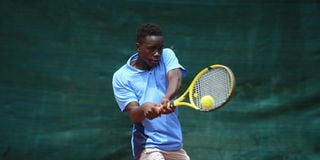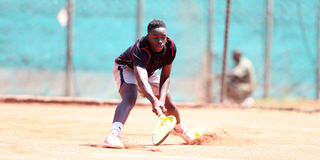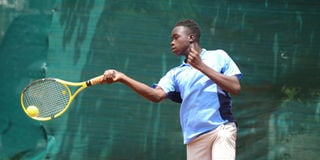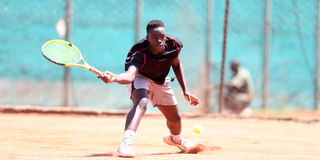Premium
Young Ominde chases tennis dream in South Africa

Baraka Ominde plays a forehand shot during J30 Nairobi ITF East Africa Junior Tour match at Nairobi Club on January 23, 2024.
What you need to know:
- Due to training with his older brother Derick at the Oshwal Sports Complex in Nairobi, Jared says Baraka’s confidence level is higher
- What gives Jared even more belief that Baraka is on the right path is that Gatoto went to EPQ tennis academy when his ranking was also around 2,000, but he is in the top-200 today
- Jared noted that Baraka needs 14 tournaments in a year to improve his rankings and exposure
Growing up, Ruinclife Baraka Ominde dreamt of being a professional tennis player but could 2024 be the year his breakthrough finally arrives?
That is the million-dollar question, but for now two things are clear, his talent and potential.
He started 2024 on a high by winning the International Tennis Federation (ITF)/ Confederation of African Tennis (CAT) Eastern Africa Championships held from January 6 to 9 in Bujumbura, Burundi.
From finishing third after losing to Burundian Allan Gatoto in the semi-finals of 2023 edition, Baraka outclassed another Burundian Miki Igiraneza 6-2, 6-1 in this year's final to qualify for the ITF/CAT African Junior Tennis Championship for players aged 16 and under slated for later in the year.

Baraka Ominde plays a forehand shot to Kumaran Chinnaswamy from Australia during their third round match of J30 Nairobi ITF East Africa Junior Tour, at Nairobi Club on January 24, 2024.
His role model is former World No. 6 Gael Monfils from France.
“I like his playing style. He doesn’t give up and his court coverage is good as tries to chase all balls,” explains Baraka who also likes the never-say-die attitude of the trailblazing 2022 Junior Wimbledon Girls Doubles champion Angella Okutoyi.
Baraka has set big goals in his tennis career. Firstly, he wants to break into the top-200 in ITF Junior singles rankings by end of 2024.
In the global rankings released on January 15, 2024, Baraka was ranked 1,559th, just five places below his career-high of 1,554 achieved on January 1, 2024.
“I’m aiming at getting better rankings and making it to professional tennis,” says Baraka with deep conviction.
Nine months ago, Baraka’s world ranking was 2,800. But, he has been on the rise since joining Tennis EPQ International Academy in South Africa in March 2023.
The cost of nurturing his talent is huge, but seems to be worth it.
He pays South African rand 15,500 (Sh135,105) per month for a year at the academy for individual evaluation, high performance training program and housing. This does not include ITF entry fee, racket stringing, reel strings, playing and jogging shoes and visa application, among other costs.

Baraka Ominde plays a forehand shot during J30 Nairobi ITF East Africa Junior Tour match at Nairobi Club on January 23, 2024.
Baraka is trained by South African coach Jeanna Schmidt. When in Kenya, Baraka is trained by several coaches, including his father Jared and renowned coaches Allan Atola and Rosemary Owino.
“Baraka has the potential to be a top tennis player, he is strong mentally, has the physique, he is tall and strong. For you to be a solid tennis player, you need that height,” explains Jared.
He admits that Baraka has made significant progress in the nine months he has been at the South African academy – mentally, game-wise and physically.
“The training has made him strong, his game style and physique has really improved. His kick serves are strong, he can rally more and hit the ball through,” notes Jared who did sprints and jumping events during his days at Gombe Kokulo Primary School.
Due to training with his older brother Derick at the Oshwal Sports Complex in Nairobi, Jared says Baraka’s confidence level is higher.
“Derick beats him with just experience, but Baraka’s intensity is great. Winning the zonals in Burundi has also boosted his confidence and he is ready for ITF tournaments. By God’s mercy things will work for him,” says Jared.

Baraka Ominde plays a forehand shot to Kumaran Chinnaswamy from Australia during their third round match of J30 Nairobi ITF East Africa Junior Tour, at Nairobi Club on January 24, 2024.
What gives Jared even more belief that Baraka is on the right path is that Gatoto went to EPQ tennis academy when his ranking was also around 2,000, but he is in the top-200 today. Gatoto has a career-high of 123 in the ITF Junior singles ranking (January 1, 2024).
“It means that the high performance academy is no joke. I believe Baraka is at a good place,” observes Jared.
If Baraka wins the Africa Junior Championship, Jared hinted, he will then travel to the Junior Orange Bowl International Tennis Championship in the USA which tennis legends Andre Agassi, Steffi Graf, Justine Henin, Juan Martin del Potro, Andy Roddick, Maria Sharapova and Caroline Wozniacki, among others, participated in during their heydays.
“I’m going to train harder and with people who are better than me so that I can get top-200 this year,” disclosed Baraka who believes that his goal is achievable. He noted that by being at the academy he had improved in all aspects, including his English and communication skills.
Some of the players that Baraka has been training with in Kenya include his brother Derick, 20, Brandon Sagala, 19, Raymond Oduor, 18, and Liberty Kibue, 17. When in South Africa, Baraka trains with South African Johan Coetzee, 17, and Gatoto, 16.
When Nation Sport got hold of him on January 19, Baraka was training with his older brother Derick who was part of Kenya Davis Cup team in 2022 and 2023. He started playing tennis at seven years old after learning it by watching Derick play.
“He advised me to bend more on low balls and work on my movement more,” Baraka reveals Derick's advice.
On his part, Derick adds that everything is all about hard work.
“The more he pushes, the more the doors will open for him,” said Derick, who believes Baraka has good strokes, but needs to work on pumping himself and winning points.
“I feel it's Baraka’s time,” says Derick who completed high school at EdOption in 2021 and is hoping to join college in the USA to pursue Sports Management.
Tennis family
Tennis runs in their family. Baraka’s father, Jared was a tennis ball boy for his elder brother Peter Orwa before playing the sport briefly and then ventured into coaching tennis.
Orwa, the first-born in the family of five boys, was part of the Kenya Davis Cup team in 1989. He had a career-high of 755 in singles on ATP in May 1986. Orwa has coached tennis in Kenya and Germany.
Jared's brother Maurice Ominde also coached tennis at Kenton College in Nairobi before passing away years back.
Orwa’s children Emmanuel, Tony, Tamara and Yvonne all played tennis. Emmanuel and Tony are now coaching tennis here in Kenya, while Tamara relocated to Germany.
“Yvonne was one of the most promising tennis talents in Kenya in late 1990s and 2000s, but unfortunately passed away approaching her peak after returning home from a tournament in South Africa,” said Jared.
Jared, who played football up to the nationals with Lwala Kadawa Secondary School and for Kuala Lumpur FC in Kisumu at club level, has been coaching tennis for over 15 years.
He says he saw potential in his boys when Derick and Baraka were around nine years old although the latter started playing tennis aged seven.
His daughter Innes Achieng,16, played tennis up to 14 and under, but stopped after joining St Angela Karura Secondary School which has no tennis courts. His second-last born son Lionel Ominde, nine, from Simmoga Valley Primary School is also a tennis player.
“It has been a rough path supporting these talents. It requires a lot of financial support. I have invested a lot in their tennis, but I can’t do it alone. If sponsors can chip in, then I believe Baraka can really go far,” says Jared.
He noted that the budget for one player such as Baraka in a two-week tournament abroad is between USD1,500 and USD2,000 (Sh242,625 and Sh323,500).
“For junior grade tournaments like J30 and J60, there is no free accommodation and remember flight is on you. You need strings and one roll costs about USD150 (Sh24,262) and stringing one racket USD15 (Sh2,426). There is also water and food where you need to have a balanced diet…tennis is really an expensive sport,” explains Jared.
Baraka also does online schooling for USD324 (Sh52,407) per month from February 2023.
Jared says tennis equipment is expensive and support will come in handy.
“One racket goes for Sh20,000 and you need three to four rackets. Shoes cost Sh10,000 one pair which cannot last two months and you need two pairs. You need jogging shoes which cost Sh7,000 per pair. Then you need to pay the court because there are very few public courts in Kenya. For public courts like Karura, you pay an entry fee of Sh200 and a similar amount to use the courts. A can of three quality balls costs Sh1,500 and you need at least two per week,” says the tactician who also trains tennis at the Oshwal Nursery School, Nairobi.

Baraka Ominde plays a forehand shot during J30 Nairobi ITF East Africa Junior Tour match at Nairobi Club on January 23, 2024.
Apart from these, Baraka needs massage and fitness training as well as to pay the travelling coach who pockets around Sh5,000 per day.
“If you have sponsors, then you are already a champion. You have nothing to worry about because you concentrate on the game, you are able to get the equipment needed, exposure and motivation. It boosts your mental strength,” says Jared.
He underlined the importance of exposure to players saying it makes them strong mentally. Jared noted that Baraka needs 14 tournaments in a year to improve his rankings and exposure. East Africa is lagging behind in terms of organizing the ITF tournaments with Kenya leading with just nine.
“By playing against the Arabs and wazungus, it removes that stage fright when you meet them again and your level of the game also improves,” observed Jared.
He says playing many tournaments in different climates and even altitude also improves a player’s exposure.
“Egypt, for example, is a very windy country and if you play there for the first time it can be very frustrating. Without good training and playing many tournaments to get experience and exposure, it limits a player’s performance,” notes Jared.
Apart from tennis, Baraka also likes playing video games, football and swimming. He played football for Rosslyn Academy as a defender and goalkeeper. His favourite swimming style is freestyle.
“I love swimming because it cools my muscles,” says Baraka who believes he is blessed like his name as his parents support his tennis journey by providing everything he needs.
Baraka, who has been to 15 countries because of tennis, including the UAE and Qatar, loves to live by his dad’s favourite quote: "What you put in is mostly what you are going to get."
His advice to other young ones and aspiring tennis players is “listen to coaches and work harder and you will succeed”.





